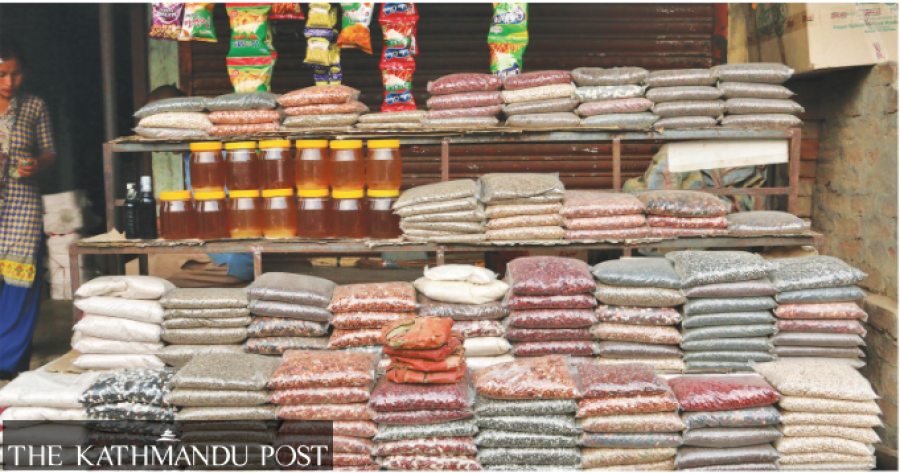Money
Elections and soaring fuel prices may trigger hyperinflation, economists say
Inflation breached the central bank’s 6.5 percent tolerance limit and crossed 7 percent in the first five months of 2021-22.
Krishana Prasain
Nepal may be looking at imminent hyperinflation as a combined result of the looming election season and soaring gasoline prices, warn consumer rights activists.
The government has scheduled local elections for May 13, the second time Nepalis will be voting for their municipal representatives after the promulgation of the new constitution in 2015.
Consumer activists say that in a country like Nepal, the political situation always has an effect on market prices, especially after election dates are announced. Motor fuel prices have already jumped to a historic high.
“With soaring fuel costs fanning inflation, the upcoming election will cause a headache for the government,” said Madhav Timalsina, president of the Consumer Rights Investigation Forum. “In this situation, manufacturers and traders compromise on the quality of food products and prices as they are protected by political parties.”
Prices of goods may go through the ceiling resulting in hyperinflation if the government appears lax in monitoring the market properly, and does not rein in mounting fuel costs ahead of the planned two key elections this year, said consumer activists.
Inflation breached the central bank’s 6.5 percent tolerance limit and crossed 7 percent in the first five months of the current fiscal year. With price increases at a 64-month high, the coalition government has a tough challenge on its hands.
According to Nepal Rastra Bank, year-on-year consumer inflation stood at 5.65 percent in the first half of the fiscal year.
Adding insult to injury, state-owned monopoly Nepal Oil Corporation hiked the price of petrol, diesel and kerosene by Rs3 per litre each on Saturday, pushing gasoline prices to their highest level on record.
Following the price revision, petrol now costs a whopping Rs145 per litre, and diesel and kerosene Rs128 per litre each.
The country is already struggling with a low growth rate after witnessing a negative economic growth rate of 2.1 percent in 2019-20 for the first time in four decades.
The country’s key economic indicators still have not improved despite the finance minister's claim that the economic situation would improve.
“If a country has low-income growth and high inflation, it becomes a double-whammy, particularly for consumers,” said economist Keshav Acharya. “Then it could have larger economic repercussions.”
Acharya added that there may be a gasoline-induced political backlash ahead of the election.
Consumer activists and experts say that when elections approach, market monitoring is relaxed as political parties seek to raise campaign funds. As the poll date nears and the campaigning intensifies, price controls go out the window, they say.
Prices of edible oil, lentils, rice and vegetables are already at historic highs, activists say.
“As politicians will raise money for their election campaigns from the business community, the added burden is transferred to the consumer in the form of inflation,” said Timalsina. “There are chances not only of price hikes, but traders will compromise on quality too.”
Food adulteration is widespread in Nepal with a long list of food items ranging from milk, dairy products, spices and water to tea, edible oil and lentils found to be contaminated with unhealthy ingredients.
In the first half of the current fiscal year, quality watchdog the Department of Food Technology and Quality Control, has taken action against 11 firms for engaging in bad business practices at different district administration offices and courts.
The department has filed cases against Unilever Nepal, Hetauda for selling expired and unlabelled tea.
The department initiated proceedings against Kathmandu Dairy, Bhaktapur Dairy, Shivam Dairy, Bhaktapur and Sainju Dairy in Bhaktapur for producing and selling adulterated milk and dairy products at the district court.
The department has also filed cases against Aqua Mineral Nepal, Balaju for producing and selling adulterated processed water.
The department said that in a series of market inspections across the country, it collected 900 samples of food products. Among them, 74 samples were found to be adulterated or not fit for consumption.
“As business malpractice is growing, we have been exerting pressure on different government bodies for their proactive role,” Timalsina said.
"Even the United Nations has requested the government to prepare a guideline for the National Food Safety Policy in Nepal, but it is least bothered," Timalsina said. “It seems that the government is under the influence of middlemen and unscrupulous traders and manufacturers.”
Timalsina said the government spent millions of rupees to buy food safety vans to make on-the-spot checks of the quality of food products sold in the market, but the fancy vehicles are parked on the department premises, unused and gathering rust.
The food monitoring body refutes the charge and says everything is in order.
“I admit that unscrupulous market activities increase during disasters, pandemics and festivals, but I have not heard of prices rising as a result of elections,” said Matina Joshi Vaidya, director general at the Department of Food Technology and Quality Control. “But we will remain alert to check the market.”




 18.12°C Kathmandu
18.12°C Kathmandu













